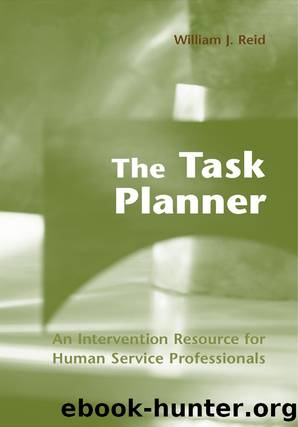The Task Planner by William Reid

Author:William Reid [Reid, William]
Language: eng
Format: epub
Tags: Social Science, Social Work
ISBN: 9780231106467
Google: PLq9Pv7XB88C
Publisher: Columbia University Press
Published: 2000-01-15T03:30:19+00:00
Task Menu
1. Keep a daily sleep diary.
Elaboration: This will assist in determining the actual severity and frequency of the sleep problems. Sleep diaries provide a means of assessing whether interventions are having an effect and monitoring changes in the frequency of the insomnia.
2. Learn about factors that might underlie your insomnia.
Elaboration: Possible causes of insomnia include: (1) physical disorders (chronic pain, gastroesophageal reflux [heartburn], sleep apnea, arthritis, fibromyalgia, cardiac problems, periodic movements during sleep, restless legs); (2) circadian rhythm problems (shift work, jet lag, delayed sleep phase syndrome, advanced sleep phase syndrome); (3) psychological factors (stress, psychopathology, nightmares, inactivity, reinforcement for insomnia); (4) poor sleep environment (noise, ambient temperature, light, sleeping surface, bed partner); (5) poor sleep habits (extended time in bed, naps, irregular schedule, bed as a cue for arousal); (6) use of substances (caffeine, nicotine, alcohol, hypnotics, tranquilizers, prescription medications, other drugs) (Bootzin & Perlis 1992).
Individuals with insomnia sometimes require lessons in such topics as relaxation training, meditation, and the regular use of exercise. Information on inadequate sleep hygiene (daily activities that interfere with the maintenance of good-quality sleep and daytime alertness) is sometimes necessary.
Practitionerâs Role: Assist the client in determining whether he or she has or is subject to any of the causal factors. If so, assist client in understanding what can be done. Then suggest sources for acquiring the proper skills or training.
3. Consult a physician to determine whether pharmacologic treatments would be beneficial for use in combination with therapy.
Elaboration: Drugs, such as the benzodiazepines, often have an immediate effect on insomnia and can be used effectively for short-term treatment; however, cognitive-behavioral treatments may be needed to maintain improvement. Long-term drug use can result in increased tolerance and side effects. Moreover, withdrawal from drugs may precipitate âboomerang insomniaâ (Van Brunt, Tiedel, & Lichstein 1996).
4. Identify expectations of sleep pattern.
Practitionerâs Role: Educate client about sleep and sleep loss. This is especially important with the elderly, as they may not realize that normal changes in sleep patterns occur with increasing age (Monane 1992).
5. Stay awake as long as possible.
Elaboration: Insomnia can be exacerbated by worrying about whether you will be able to fall asleep. This task will reduce anticipatory anxiety.
Practitionerâs Role: Suggest a paradoxical taskâto stay awake as long as possible. Be sure to provide rationales that emphasize benefits to the client, such as using the time to do constructive things.
6. Practice using progressive relaxation.
Elaboration: Relaxation provides a substitute behavior incompatible with cognitions that would interfere with sleep (Bohlin 1973).
7. Use stimulus control instructions.
Elaboration: Stimulus control instructions are a set of techniques to help establish a consistent sleep-wake pattern, make the bed and bedroom cues for sleep, and reduce the amount of activity that might associate them with other things.
Practitionerâs Role: Give the client instructions to lie down only when sleepy. Have him or her discontinue behaviors such as eating, watching television, and reading in bed, if these behaviors are incompatible with sleep. Have client get up and go to another room if they are unable to fall asleep.
Download
This site does not store any files on its server. We only index and link to content provided by other sites. Please contact the content providers to delete copyright contents if any and email us, we'll remove relevant links or contents immediately.
Cecilia; Or, Memoirs of an Heiress — Volume 1 by Fanny Burney(32527)
Cecilia; Or, Memoirs of an Heiress — Volume 2 by Fanny Burney(31928)
Cecilia; Or, Memoirs of an Heiress — Volume 3 by Fanny Burney(31916)
The Great Music City by Andrea Baker(31898)
We're Going to Need More Wine by Gabrielle Union(19020)
All the Missing Girls by Megan Miranda(15889)
Pimp by Iceberg Slim(14464)
Bombshells: Glamour Girls of a Lifetime by Sullivan Steve(14038)
For the Love of Europe by Rick Steves(13816)
Talking to Strangers by Malcolm Gladwell(13330)
Norse Mythology by Gaiman Neil(13314)
Fifty Shades Freed by E L James(13216)
Mindhunter: Inside the FBI's Elite Serial Crime Unit by John E. Douglas & Mark Olshaker(9292)
Crazy Rich Asians by Kevin Kwan(9261)
The Lost Art of Listening by Michael P. Nichols(7476)
Enlightenment Now: The Case for Reason, Science, Humanism, and Progress by Steven Pinker(7287)
The Four Agreements by Don Miguel Ruiz(6728)
Bad Blood by John Carreyrou(6599)
Weapons of Math Destruction by Cathy O'Neil(6248)
